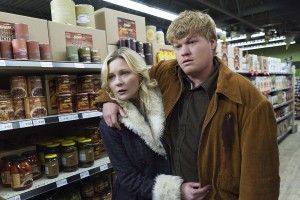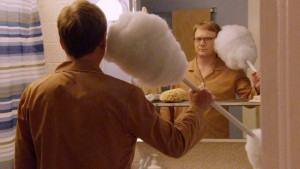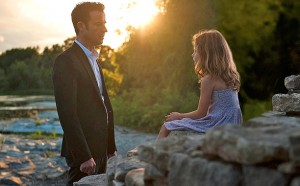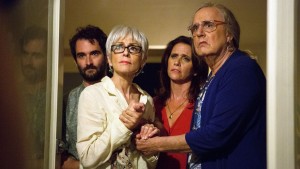So far, 2018 has certainly had its televisual ups and downs. Headlining his season of The Bachelor, Arie Luyendyk Jr. justifiably became one of the most reviled pop culture figures from a franchise that is no stranger to the human dumpster fire. Over on Starz, Ashy Slashy hung up his boomstick for good when Ash vs. the Evil Dead came to a satisfying conclusion after three seasons of comic-horror mayhem. The fourth season of iZombie ended its inconsistent and middling run with a finale that was, appropriately, inconsistent and middling. On the opposite side of the spectrum, Silicon Valley aired its best and, somehow, funniest season to date. Vida established itself as a proud voice of the LatinaX community, imbuing an authentic female gaze to a landscape in desperate need of one. Arrow is even still a thing on the CW, I guess? And that’s to say nothing of the glut of shows Netflix* dumped at our feet, a backlog I’ll be digging myself out of for years, it seems.
*New seasons of Santa Clarita Diet, Dear White People, and The Unbreakable Kimmy Schmidt, as well as the documentary series Wild Wild Country, all rank high on my priority list. Two Netflix shows I did have an opportunity to watch in 2018–The End of the F* World and On My Block–were unequivocal delights.
Along the way, though, I came across 6 series that I found absolutely spellbinding*: a crop of shows that the rest of the TV world will have to work mighty hard to topple from my best-of-the-year list. Here they are, in no particular order.
*Full disclosure: I have yet to watch Killing Eve, which I look forward to with eager anticipation. It’s a show I have a sneaking feeling might have landed on this list–or perhaps bumped this one up to a seven–had I watched it. I feel like one can’t have a list like this without disclosing those water cooler shows that remain unseen, what with the overwhelming volume of content and all.
The Americans (FX)
With its final run of episodes, The Americans secures its place in the pantheon of all-time great shows. What felt truly marvelous was that the fantastically gripping plot over-aching the season — a faction of the KGB attempting to stop Gorbachev’s agenda of Westernization dead in its tracks during a summit held in Washington, D.C. — does not overshadow the very human storytelling that appropriately takes center stage. A three-year time jump to 1987 finds Philip out of the spy game but Elizabeth and Paige still immersed, under the direction of Claudia. But when Oleg returns to the U.S. wary of Elizabeth’s role in the Gorbachev summit, Philip finds himself, inexorably, pulled back into the life he tried to leave when Oleg enlists his help spying on her. This was always a domestic drama that happened to feature spies as its central characters, and The Americans reminds us as it draws to a close that there are no stakes higher than truly personal ones.
The fracturing of the Jennings family and the collateral damage that takes its toll on so many of these beautifully-drawn characters begins to resemble a Shakespearean tragedy as each installment unfolds and it grows increasingly clear that no one will escape unscathed. The final episode is perfect: quietly devastating, utterly impeccable, and brilliantly surprising. Emmys should take note and give this series the clean-sweep it deserves in all four acting categories (Matthew Rhys, Keri Russell, Noah Emmerich, and Holly Taylor), as well as the much-deserved prize for Outstanding Drama Series.
The Assassination of Gianni Versace: American Crime Story (FX)
The People vs. OJ Simpson was a landmark television event, without question the best work Ryan Murphy had produced up to that point. Yet, when he announced that the second season of his anthology series would take on the assassination of fashion mogul Gianni Versace, I couldn’t help but feel underwhelmed. Early trailers suggested we were primed for a show taking on the opulence of the Versace dynasty, so I approached the first episode half-heartedly, expectations lowered. I’ve never been happier to have been proven wrong.
Instead of a straightforward narrative chronicling the rise and fall of Versace, we have a searing indictment of institutionalized and, perhaps even more damning, internalized homophobia. Using Versace’s killer Andrew Cunanan (a revelatory Darren Criss) as the lynchpin, Murphy paints a portrait of a fanatical killer whose emergence we should not be shocked by because he was an inevitable effect of society’s cruelly misguided fears and insecurities. Telling the story in reverse also gives us an opportunity to watch Cunanan’s evolution by way of his frightening regression. The themes are lofty and timely, but at its core, what makes this all work is the excellent writing, acting, and directing that frame ambitions far greater than I ever anticipated. This is one staggering achievement.
Atlanta (FX)
Donald Glover delivered a second season even more successful than the first by challenging our expectations with each new episode. Tones varied widely, from the nostalgic and ultimately heart-breaking “FUBU” to the unnerving horror of “Teddy Perkins” (a contender for best episode of 2018). No two episodes were ever quite the same, except that they were all impeccably written, performed, and directed.
Dedicating entire episodes to Darius, Van, and Al allowed Glover and Hiro Murai to expand their world and perspective with these ostensible narrative tangents. Except, when placed within the context of what these episodes reveal about each of these characters, we quickly realize they’re not tangents at all. The two episodes that center most heavily around Al (“The Barbershop” and “Woods”) provide us with deeper insight into his character’s conflicting struggle with fame: to stay true to himself, his history, and his home while also braving the bold new world being afforded to him through his hip-hop success. Nowhere is this conflict more clearly crystalized than in his relationship with Earn, and the show handles the tension percolating between them all season long with surprising and satisfying results by the finale.
Masterfully blending drama and comedy, Atlanta is nothing if not true to its own carefully calibrated sensibilities. I’d hesitate to label it unequivocally with either term, so let’s leave it at this: it’s the best half-hour show on television, bar none.
The Chi (Showtime)
I’d like to make one thing perfectly clear: of the shows on this list, The Chi is the messiest and least polished of the bunch. It has a ways to go before it cements itself as the prestige drama is very clearly wants to be, so that begs the question: why have I included it here? The reason is simple: it has the highest ceiling and the most potential, wearing its aspirations proudly. So even when it stumbled narratively (one character’s quest for vengeance against the man who shot his brother twists itself into knots, for instance), I remained riveted.
Comparisons to The Wire and Treme seem the most obvious here because, like those two shows, the city serving as the setting becomes the most clearly drawn character in the ensemble (Baltimore, New Orleans, and, in this case, Chicago). Like both of those shows, The Chi also has a sprawling cast of characters that often overlap in interesting ways; unlike those shows, however, not every character in The Chi feels essential just yet.
If it seems like I’m being hard on this show, it’s because I found it gripping and enthralling in so many ways, falling just short of greatness. But with the pedigree in front of and behind the camera, it has the potential to get there, and I can’t wait to see that happen.
Counterpart (Starz)
What’s better than having JK Simmons in a starring role? Why, having JK Simmons in two starring roles, of course! If you’ve been looking for a show to scratch that persistent itch that’s been pestering you since Fringe went off the air, then look no further than this sci-fi spy thriller featuring parallel dimensions, dopplegangers, and one whopper of a mystery.
Revealing anything about the plot would be a serious disservice to those who have yet to watch, so I’ll abstain from highlighting story events here. Instead, I’ll laud the careful pacing, intricate narrative, and excellent performances grounding a show that resists, for the most part, what we might expect from a story like this. Sure, Counterpart recycles a few tropes (there’s a mole because of course), but the joy is in watching Simmons play both meek Howard Silk and alpha Howard Prime so perfectly that you’d swear you were watching two different actors. In fact, I’d go so far as to say that — even in a show replete with assassinations, double- and triple-crosses, and jaw-dropping plot twists — scenes with both Howards simply sitting down and talking are some of the most gripping in the entire season, precisely because of Simmons’ flawless work here. Do yourself a favor and seek this one out.
Westworld (HBO)
I seemed to enjoy Westworld in its first season more than most professional critics, but I can still say that its second — even with three of its ten episodes left to air — is an impressive improvement to the narrative and characterization driving this story. This success comes from a two-fold approach: increased engagement with the philosophical conceits underpinning the series, as well as a deeper exploration into Delos’s motivations behind the park.
While last year was sometimes bogged down by narrative threads that weren’t as intriguing as the rest (cough, cough Man In Black), that issue has been fixed. Maeve’s quest to find her daughter takes her into Shogun World with some of the best supporting characters in the show (shout out to my man Felix!); with the William reveal out of its system, the Man In Black’s story is morphing into something more fascinatingly personal; Dolores continues to set Westworld ablaze on her quest for freedom and choice; even Ghost Nation is comprised of characters far more important than the stock stereotypes we feared, in season one, they might be. This raising in stakes and refining of plot threads has given the show a relentless sense of momentum.
If you were confounded by the timelines from season one, then buckle in. This time — thanks to Bernard’s scrambled mind — the show jumps back and forth across more timelines that you can count. If this all sounds more work than it’s worth, rest assured that this is no gimmick. Time, it turns out, lies at the heart of everything. In embracing its inner Black Mirror-esque sensibilities, Westworld has become vastly more exciting: something richer, bolder, and more complex. It turns out these violent delights might have violent ends just yet.
Thanks for reading! Let me know if there are any other must-watch shows I might have missed in 2018.




